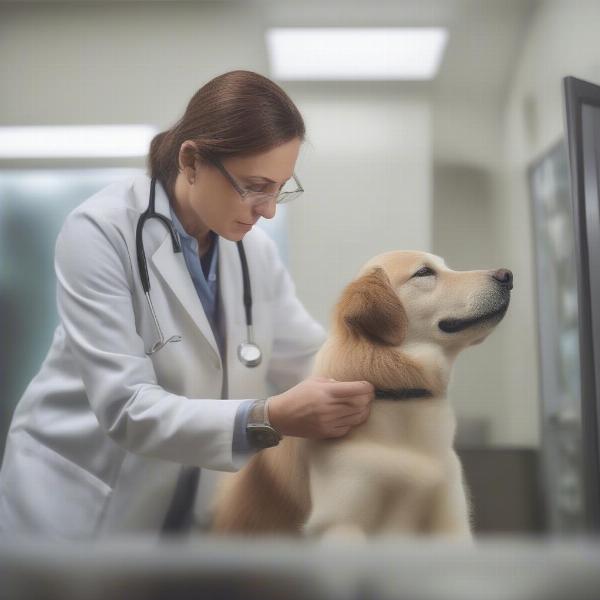Muricin for dogs is a topic that often raises questions among pet owners. Understanding its potential benefits and risks is crucial for responsible dog ownership. This guide will explore what muricin is, its potential uses in veterinary medicine, and important considerations for dog owners.
What is Muricin?
Muricin is a mixture of peptides derived from the mucus of the predatory marine snail Dicathais orbita. While research on its applications in veterinary medicine is still in its early stages, some studies suggest potential benefits as an antimicrobial and wound-healing agent. It’s important to note that muricin is not currently approved for widespread veterinary use and should not be administered without consulting a veterinarian.
Potential Uses of Muricin in Dogs
While research is ongoing, some studies suggest potential applications for muricin in canine health, particularly in:
- Wound Healing: Muricin’s antimicrobial properties might assist in preventing infections in wounds. Some research also indicates potential for promoting tissue regeneration.
- Skin Infections: Muricin could potentially be used to treat bacterial or fungal skin infections in dogs.
However, it’s crucial to understand that these potential uses are based on preliminary research, and more studies are needed to confirm their efficacy and safety in dogs.
Is Muricin Safe for Dogs?
The safety of muricin for dogs is still being investigated. While some studies have shown promising results, further research is needed to determine appropriate dosages, potential side effects, and long-term effects. It’s essential to consult with your veterinarian before considering any treatment involving muricin for your dog. Do not self-administer muricin to your pet.
Alternatives to Muricin for Dog Health
There are several established and veterinarian-approved treatments available for wound care and skin infections in dogs. These include:
- Antibiotics: For bacterial infections, antibiotics prescribed by your veterinarian are the standard treatment.
- Antifungals: For fungal infections, your vet may prescribe antifungal medications.
- Topical treatments: Various creams, ointments, and sprays are available to manage skin infections and promote wound healing.
- Wound dressings: Bandages and other wound dressings can protect wounds and aid in the healing process.
 Veterinarian Examining a Dog
Veterinarian Examining a Dog
Conclusion
Muricin shows promise in veterinary medicine, but it’s still in the early stages of research. It’s vital to consult with your veterinarian before considering any treatments involving muricin for your dog. Your vet can advise you on the best course of action for your dog’s specific health needs.
FAQ
- What is muricin derived from? Muricin is derived from the mucus of the Dicathais orbita marine snail.
- Is muricin safe for dogs? More research is needed to determine the long-term safety and efficacy of muricin in dogs.
- Can I give my dog muricin without consulting a vet? No, you should never administer muricin or any other medication to your dog without consulting a veterinarian.
- What are the potential uses of muricin for dogs? Some research suggests potential uses in wound healing and treating skin infections.
- What are some alternatives to muricin? Established treatments for wound care and skin infections include antibiotics, antifungals, topical treatments, and wound dressings.
- Where can I learn more about muricin for dogs? Consult with your veterinarian for the most accurate and up-to-date information.
- Is muricin currently approved for use in veterinary medicine? No, muricin is not currently widely approved for veterinary use.
ILM Dog is a leading international pet website dedicated to providing expert advice on dog care and wellbeing. From breed selection and health to training and nutrition, we offer a wealth of information for dog owners of all experience levels. Explore our comprehensive resources and discover the latest trends in pet care. For expert guidance on your dog’s health, contact us at [email protected] or call +44 20-3965-8624. Visit ILM Dog for more information.